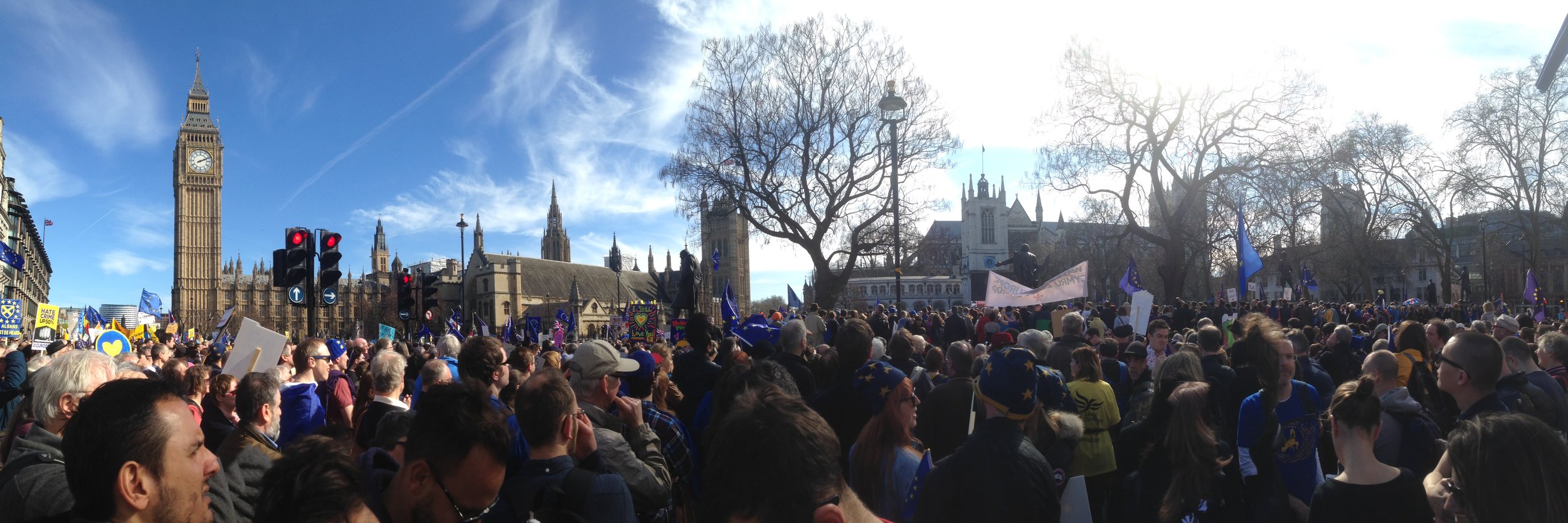Why I am voting for the Greens
In 2019 the New Statesman didn’t endorse any party during the December election. They announced this under the headline “Britain deserves better.” Well, nearly five years later I’m here to say something similar, but crucially different.
I’ll come to the bit where I say Keir Starmer and the Tories are basically the same. Don’t worry. First, I want to say something else. Something I believe more strongly.
This parliament, the one since the 2019 election, has been unlike any I have experienced before. Brexit finally happened, then we were hit with a pandemic, the Queen dying, Liz Truss’s five minutes in power, Donald Trump’s capital riots, Putin invading the Ukraine and a whole host of other things. It’s been a whirlwind.
All the beauty and all the terror
Since the pandemic ended and we have come back into the world, I have experienced more beauty than I could have ever imagined when we were locked inside. The collective joy of live music, the intensity of theatre, the communal pleasure of sharing a horror or comedy film with a room full of strangers, all these things I had forgotten. I had forgotten what it was like to sit in the pub with friends or take a train to somewhere new. There are so many beautiful things in the world that my heart swells with joy to think of it.
There is also so much terror. From mass death in Gaza, where civilians are killed in horrific numbers, to rockets raining down on Ukrainian cities, to lives forever ruined by the aftermath of the pandemic, to victims of an ever-worsening climate and ever-increasing racism towards people from outside Europe, this is an age where living can be a terrifying ordeal.
Sometimes I feel like these moments of beauty - finding something genuinely funny or beautiful on Instagram, eating something sweet, or singing along to a song with friends - are amongst the last we will experience as humanity hurtles towards oblivion. I want to treasure every single second of them.
Shared values
Injected into this mix of fear and elation is this year’s general election. Putting an X on a ballot paper once every four or five years shouldn’t be the end of our political engagement. The world is too complex for that. However, everything has been focused down to this one moment and we need to make a choice from a range of parties.
I simply don’t feel that Starmer shares my values. Not socialism - I am a socialist, and he obviously is not - but valuing these moments of heartbreaking beauty in a world of terror. Sometimes I don’t know if I want to cry or sing, sitting on a late-night Overground train. I don’t believe anyone who sees the fragile beauty of this world, and how it is assailed by soul crushing terror, could stand on the platform of minor change and not rocking the boat.
We live on a knife edge. Terror or beauty. Sometimes a better world is so close that I can almost smell it. I see people organising fundraising drives for refugees thousands of miles away that they will never meet because it is self-evidently the right thing to do. I see people striving hard against the cost of living, a government that makes everything difficult for regular (i.e. non-rich) people and indifference to bring a little more joy to their communities, such as by keeping a much-loved bookshop or cafe open. Every day so many people choose beauty, but a few powerful people choose terror and the bookshops close and death reigns from the sky.
Maybe I am wrong
Against this backdrop Starmer chooses indifference. I don’t understand it. We need a rallying cry for a better, more beautiful, world. If not now, then when? All Starmer gives is indifference to terror dressed up as pragmatism.
Maybe I’m wrong about Starmer. Maybe this is all a clever plan to win the necessary support of the angry boomer swing voters, so that Labour can get into power and then radical reform can follow. If this is what happens then I owe Starmer an apology and a vote. As well as an apology to all the people, friends and writers, who say this is the case. I don’t believe it. I may be wrong.
This brings us to the Starmer is just like the Tories bit. From dropping the £28bn green investment pledge, to saying Israel has the right to cut off water and power to Gaza (they don’t), to pandering to widespread hysteria about trans rights, Starmer is so determined to win the support of a pathologically angry boomer in Nuneaton called Steve - who hates young people, hates migrants, hates trans people, hates ULEZ, hates spending money on making things better and above all hates people who go on protests - that Labour looks a lot like the Tories. It’s just so depressing.
Getting over the line
For what it’s worth, I do think Starmer will be a better Prime Minister than Rishi Sunak or any other Tory. If he drags the Labour Party over the line and into power then I will raise a hoppy craft beer to him and say, “good job, you did it where Gordon Brown, Ed Miliband and Jeremy Corbyn failed.” Doubly so if the Tories get a massive and justly deserved kicking. In that case it will be a double hopped IPA.
Hopefully Starmer with his massive majority can use the huge power of the British state (whatever the condition of the economy) to alleviate the worst problems caused by the Tories over the last 14 years, from the huge rise in homelessness, to the inhuman levels of child poverty, to the dire shape of the NHS. Then again, without wanting to turn on the spending taps, remove the two child benefit cap or do anything to worry landlords, improvements might not happen.
The issue of the climate
My main issue with Starmer is on environmental policy. This is the biggest challenge humanity has ever faced and is the defining issue of the present. The time for radical action has passed and we need very radical action to avert the worst of the climate disaster we are racing towards.
There is a beautiful sustainable world within our reach, where we work less and enjoy life more, but again our leaders in politics and business are choosing climate terror. Starmer needs to be bolder on this issue, which is why I am voting Green: to send a clear message to Labour that more needs to be done and soon.
Getting the Tories out
I have no problem with anyone who wants to vote Labour to get the Tories out. In fact, I salute you for using the choice you have today to make this country a better place. The Tories are awful and they have to go. Voting Labour is the most expedient button to press to achieve this.
My beef is not with Labour voters, or Labour Party members, or even many Labour MPs. It’s with a small group at the top of the party whose view of humanity is so cynical that they cannot make a case for something better, so instead move to the position that will get them into power; even if that involves pandering to prejudice on migration or trans rights.
I am aware of the irony of not voting Labour in an election where Labour is about to win very big. Through backing Corbyn and Miliband, and not Starmer, it’s clear I cannot choose a winning horse. I have voted Labour in only one general election that the party won (2005) and even then, the candidate I voted for lost out to a Tory.
I do like my local Labour MP, Stella Creasy, who has been very good on several key issues, from feminism to the war in Gaza. Her office was vandalised recently, which is a disgusting act of intimidation aimed at someone who is genuinely striving to make the lives of people in Walthamstow better. I’m sorry not to be able to vote for Creasy this time, but it makes little difference as she’s likely to win the seat by about 20,000 votes.
Labour winning without my support
I’m not going to vote Labour and Labour are going to do very well tonight. I guess that means Labour was right to alienate people like me. So be it. Perhaps this justifies everything Starmer, and his pals, have done to drive out people like me and win the vote of Steve from Nuneaton (or at least make him stay home on election day). This is even more the case if Starmer does some good with power.
In my darker moments, I wonder if I am the problem for Labour. Maybe my values - improving the environment, equal rights for trans people, welcoming migrants and wanting a world full of beauty and not that of terror - are so wildly out of step with the average person in the street, who has their own struggles and dreams, that I must be driven from mainstream politics as an extremist. Certainly, lots of people I meet disagree with me and feel the need to tell me I am wrong.
Am I an extremist for wanting things to be different? I still want a world filled with beauty for everyone, and around me I see a lot of people who want terror for people who are different to them. You might say that no one wants terror, but with the glee that people, from friends to writers, have endorsed military actions with massive civilian casualties in Gaza and a hostile environment for migrants trying to find a better life in the UK, I feel confident in saying that some people do want terror. I won’t change or compromise in my love of beauty.
Labour needs to do better
I want to send a message to Labour that they need to do better. There will never be a better chance to be honest with the electorate about what needs to be done to improve the country, now the Tories have completely self-destructed, but there has also never been a better time to make a case for why we can build a more beautiful world, while so many people are suffering and crying out for something better.
It’s not just on the climate, Labour needs to do more in so many areas to help those suffering right now. More than just pointing to growth and hoping that sorts things out. The Greens have some good ideas in their manifesto, such as a no-fault eviction ban, free personal care and cancelling trident. I am voting Green because I want these things and because I want to send a message to Labour that this slide to the right is against my values as a long-time supporter of the Labour Party. Labour needs to do better than its current festival of political cynicism.
I’m tired of being told that we need to be pragmatic by cynical people when the whole world is dying. If anything, the pragmatic thing to do is something bold, something inspirational, something beautiful. Not to just shrug our shoulders and say this is the best we can do.
"Extinction Rebellion-11" by juliahawkins123 is licensed under CC BY 2.0


























